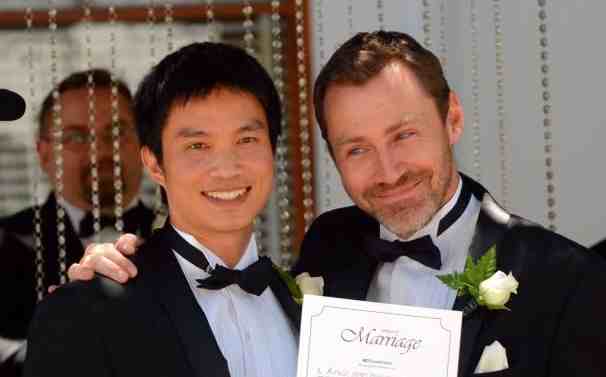Ivan Hinton and Chris Tench were among the first couples in same-sex marriage, in Canberra in 2013 courtesy @ABC (AAP: Alan Porritt)
Melbourne, November 8: Anxiety within the lesbian, gay, bisexual, transgender and intersex (LGBTI) community will be a record high today, set to continue for some more time as arguments and debate rage through for three more years.
Turnbull government’s proposed plebiscite on same-sex marriage was defeated 29-33, last night in the Senate vote, amidst warning that it could delay same-sex marriage probability “for years”.
Attorney-General George Brandis warned that plebiscite would pave the way for same-sex marriage but if defeated, “the cause of marriage equality will be delayed for years”.
He called Labor’s earlier decision to block the plebiscite, “one of the more cynical exercises in politics that I have ever seen” and asked the Senate to “stop playing politics with gay people’s lives”.
Senator Jacqui Lambie, who is opposed to same-sex marriage on “religious grounds”, said that she would have respected the will of Tasmanians after the plebiscite.
But the developing scenario over the last few months manifested in Labor, Greens, Nick Xenophon Team and Derryn Hinch together voting against the proposal.
That has now effectively blocked the opportunity for Australians to have a conscientious say on a decision that affect our homes, society and essentially our future – our children.
Opposition leader, Bill Shorten reiterated Labor’s view that it was unnecessary, expensive and had the potential to cause mental ill health among LGBTI people – a rather political move, considering that Mr Shorten had originally raised ‘plebiscite’ in a 2013 public forum.
He would rather have “the people of Australia could make their view clear on this than leaving this issue to 150 people”, Mr Shorten had said then.
Blocking the Plebiscite was NO Victory
Support for ending the perceived discrimination against gay and transgender adults over the right to civil marriage is growing in Australia.
As Environment Minister Josh Frydenberg, talking about Labor’s position, said on ABC TV: “…If they are serious about allowing gay people to get married … then they should support the plebiscite because polls show that it will be successful.”
A University of Melbourne study suggested that just one electorate in rural Queensland seat of Maranoa, had a majority of voters opposed to same-sex marriage.
The study found that opposition to changing the Marriage Act was less than 10 per cent in inner-city electorates in Sydney and Melbourne.
Monash University political scientist Shaun Ratcliff, who was one of the researchers, said that a vast majority of electorates wanted change.
“Based on our data and other polling, it appears a plebiscite would pass easily,” he said.
Even Australians for Marriage Equality had earlier argued in favour of plebiscite:
“In the current circumstances it (plebiscite) promises the least delayed, least painful and least uncertain path” to change the law.
A Newspoll in The Australian found that a whopping 62 per cent of Australians would endorse “equal marriage laws”.
A Fundamental Right to Debate now missed
It was a fundamental right and now a missed opportunity for the LGBTI community to argue, debate and demand for rights, they perceive as being equal.
History tells us that any evolutionary change in society has always gone through robust debates, especially in successful western democracies and I believe the LGBTI community with its high-profile campaigners in Australia, is stronger than we are led to believe.
Mentally, financially and physically!
The underlying principle of blocking the plebiscite is that it would be emotionally and mentally draining and would basically permit the society to question the legitimacy of such relationships.
Yet, carrying the mantle of victimhood is not the righteous way to repeal “unjust” laws.
Many in LGBTI community, including health experts believe that a plebiscite would bring about significant negative health impact on the already marginalised; but to lengthen that negative impact without a plebiscite, would have to be an immeasurable health cost to LGBTI community.
The LGBTI community needed a resolution rather than stagnation and the vote against plebiscite is doing just that – prolonging their misery.
What is a Democracy without Debate and what is Evolution with a Fight!
It is a terrible message to send to the entire community that a campaign for LGBTI community’s demand for equal marriage laws is precariously poised against their mental health.
The LGBTI community would be better balanced, campaigning for equality than campaigning victimhood – which can set off an unstoppable strain, rightly or wrongly, for many other campaigns in today’s society.
Yes, the fear of marginalisation during the debate process could have been mentally exhausting.
But it also could have been a time for supporters – parents, friends, colleagues and the largely supporting Australian society to stand up, said Tim Wilson, federal Liberal Member for Goldstein and former Human Rights Commissioner.
One of thousands of same-sex couples, he has been engaged to marry and is waiting for the law to change.
“Their engagements, mine included, represent a hope in our country and an expression of their faith in their fellow Australians.
“…That is a future worth fighting for,” he wrote.
Although the government had budgeted $170 million to run the plebiscite, same-sex marriage is now effectively delayed until 2020s.
Nidhi Mehta
Similar Posts by The Author:
- Supriya Shrinate delivers Kangana Ranaut a huge advantage
- The Mahua Moitra saga – Is she a victim for Shashi Tharoor to save?
- Election 2022: Matthew Guy is closing in on Daniel Andrews
- Harry and Meghan claims: Queen responds but the Today team is divided
- Alleged Hindu phobia gets Rinku Sharma killed in India

